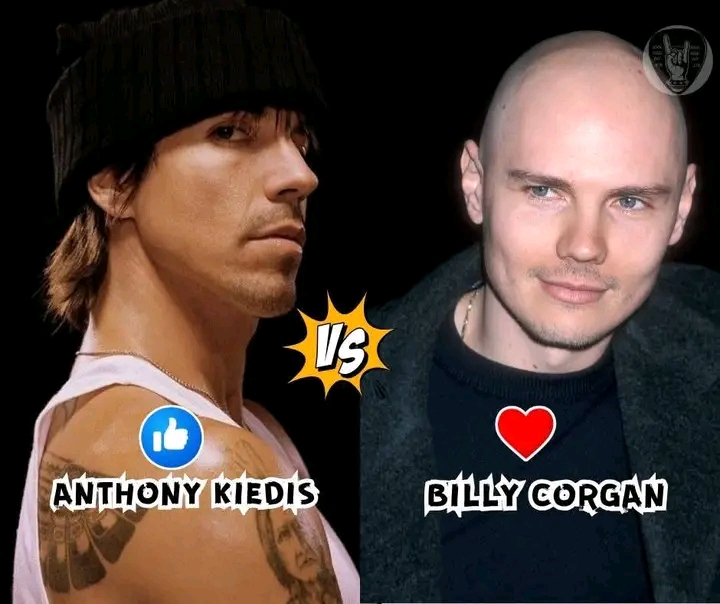Anthony Kiedis vs. Billy Corgan
Funk flow vs. alt angst,Anthony Kiedis — the wild heart of the Red Hot Chili Peppers.
He raps, sings, and grooves through life’s chaos — all funk, feeling, and California sun.
Every lyric dances, every rhythm breathes freedom
Anthony Kiedis stands as a sun-soaked storm of rhythm and raw soul, the restless voice of California’s golden chaos, a man whose artistry doesn’t simply exist in melody but in motion — in every bounce, glide, and groove that ripples through his veins like Pacific waves crashing against Venice sands. Where others narrate life, Kiedis performs it — rapping, singing, chanting his way through heartbreak, addiction, redemption, brotherhood, and bliss, weaving funk with vulnerability and turning street stories into stardust poetry. He is the living embodiment of motion — a body that never stands still, a voice that leaps from spoken word confession to soaring chorus, a spirit forever chasing the sun through alleyways of Los Angeles, barefoot in heart and electric in soul. His lyrics don’t arrive as structured sonnets but as living organisms — breathing, sweating, diving into the deepest corners of life’s imperfections. Songs like “Under the Bridge” bleed with loneliness and longing, yet still shimmer with hope; “Give It Away” bursts with generosity and wild joy; “Scar Tissue” aches but smiles through the pain. Kiedis never tries to be perfect — he tries to be honest, and that’s why every line he delivers crackles with realness. His voice is not flawless, but it is alive, and that makes it unforgettable — drifting between rap, melody, and rhythmic spoken word with effortless swagger. He is not just a frontman; he is a storyteller riding the funk, guided by flea-slapped basslines, John Frusciante’s warm guitar cries, and Chad Smith’s thunderous heartbeat. Anthony doesn’t sing about California — he is California: glittering, gritty, heavenly, broken, blazing with sunsets and sin, with palm trees swaying over scars and dreams. He exists in the intersection of danger and beauty, chasing transcendence through sound. His stage presence is its own language — shirtless, fearless, swirling his microphone cord like a lasso of light, moving like an untamed spirit with tattoos etched like sacred scripts across his skin. He gives everything — not because he has to, but because the music is the only place where his truth makes sense.
In contrast to Billy Corgan’s brooding midwestern melancholy, poetic angst, and dreamlike alt-rock darkness, Kiedis is the wildfire — a blast of color, heat, and groove. Where Corgan peers inward through shadows, unraveling pain in lush distortion and whispered sorrow, Kiedis explodes outward, thrusting joy and heartbreak into communal celebration. Billy Corgan’s universe is moonlit, tinted with loneliness, philosophy, and the ache of unspoken words — an artistic cathedral of distortion and dreamscape. Anthony Kiedis’ world, on the other hand, is drenched in sweat, sunlight, graffiti, and freedom — a graffiti-splashed diary written in skate parks, deserts, rooftops, and late-night highways. But this isn’t to say Kiedis is all sunshine — he has walked through fire too. Addiction scarred his past, loss haunted his footsteps, but like a phoenix dipped in funk and healing, he rose again, repeatedly, pouring his brokenness into song. His voice isn’t a cry from the void like Corgan’s — it’s a heartbeat echo, a friend shouting “You’re not alone, feel this with me!” The Chili Peppers don’t perform for the audience — they perform with them. Kiedis invites the crowd to dance in their pain, to sweat out their sorrow, to groove through grief until joy finds them again. There’s a tribal pulse to his music—funk rhythms that compel bodies to move even when hearts are heavy. This is the power of Anthony Kiedis: he brings light into chaos, rhythm into confusion, and melody into the mess of being human.
Every era of Kiedis tells a chapter — from the wild, shirtless, neon-lit punk-funk of the ’80s, to the introspective soul-searching of the ’90s, to the wiser, calmer storyteller he is today. His strength lies not in perfection but in evolution. He grew from reckless youth into spiritual seeker, from street poet to global icon — but never lost that mischievous glint of rebellion in his eye. Even now, when he steps onto the stage, microphone in hand, hair flowing or shaved, tattooed chest rising with breath, there’s a spark that tells you he still believes in the magic of performing, in the healing that music offers. He is not trying to out-think the universe like Corgan often does; he is trying to feel it, touch it, taste it. His artistry is visceral, physical, alive in the sweat on his brow and the tremor in his voice when he sings about love, loss, and the fragile beauty of being alive. Funk is not just a genre for Kiedis — it is a philosophy, a way of life: to move, to give, to share, to love, to hurt, and to heal in rhythm. And through decades of sound, scandal, silence, recovery, and reinvention, Anthony Kiedis remains the wild heart of the Red Hot Chili Peppers — a soul forever dancing between chaos and harmony, forever chasing the sun across California skies.
